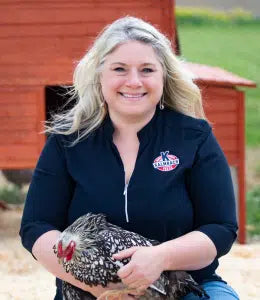Duck and Geese Diet: A Nutritional Guide

Are you wondering what to feed your ducks and geese to keep them healthy and happy? You’re not alone! As waterfowl owners ourselves at Kalmbach Feeds, we’ve spent the last 60 years helping farmers and poultry hobbyists raise thriving flocks. We know that ducks and geese need the right nutrition at every stage of life to stay healthy. Whether you’re new to raising waterfowl or looking to improve your current feeding program, we’re here to share what we’ve learned about keeping these wonderful birds well-fed and flourishing.
The Importance of a Healthy Geese and Duck Diet
If you’ve spent any time watching your ducks and geese, you’ve probably noticed how quickly they grow and how energetic they are. That’s why getting their nutrition right is so important! Your birds need different types of nutrients as they grow from fuzzy ducklings and goslings into adults, and we’ve learned a lot about these changing needs over the years.
It’s fascinating how unique waterfowl are when it comes to their nutrition. Did you know that young water birds grow incredibly fast and need 20% more protein to support their growth? That’s exactly why we created our 20% Flock Maker feed, to give these rapidly growing birds exactly what they need.
Ducks and geese also need to have a feed that incorporates B vitamins (especially niacin for healthy leg development), plus the other essential vitamins and minerals that work together to keep your birds healthy and active. When birds get the right nutrition, we see better immune systems, more eggs from layers (so important right now with egg prices being what they are), and flocks that are happier and more energetic.
What to Feed Ducks
Let’s talk about keeping your ducks well-fed and happy! The foundation of any good duck diet starts with a quality feed. Our Duck, Goose, and Swan Feed is specially formulated with exactly what your ducks need, plus our special LifeGuard® blend of prebiotics, probiotics, and essential oils to support digestive and immune health.
Do you keep more than just ducks? No problem! Our 16% Flock Maintainer is perfect for ducks over 6 weeks old living with other poultry. It’s all-natural (no antibiotics or animal byproducts here!), packed with amino acids, and boosted with vitamins A and E for strong immune systems.
Don’t forget to let your ducks do what comes naturally: foraging! Ducks love hunting for insects and nibbling on fresh greens, which adds variety to their diet. Did you know that ducks love to dip their food in water while they eat? Make sure your ducks always have clean water available near their feeding area. In addition to drinking, water is an essential part of their eating process!
What Not to Feed Ducks
Now, let’s talk about what to keep away from your quacking friends. You might be tempted to share bread or other treats from your kitchen, but these foods can actually harm your ducks. They fill up their tummies without providing the nutrition they need. Avoid moldy feed, avocados, chocolate, caffeine, and salty snacks. These can all cause serious health issues for your ducks.
What to Feed Geese
Young geese thrive on our 20% Flock Maker until they are 6 weeks old, then transition to the 16% Flock Maintainer. Here’s a fun fact: geese can get up to 30% of their nutrition from grazing! Provide plenty of fresh grass and greens, and offer whole grains during colder months when natural foraging is limited.
What Not to Feed Geese
Keep your geese away from moldy vegetation, bread, and crackers. Remove toxic plants like nightshades from grazing areas, and don’t overdo high-protein foods for adult geese. They need less protein than you might think.
Other Duck and Geese Nutritional Tips
Ducks and Geese need more than just the right kinds of food, they also need fresh water, special care at different times of the year and throughout their life span, and monitoring of their health. Here are some tips to help keep your flock healthy their whole lives.
Water and Feed Management
Position water containers near food, but not so close that the feed gets wet. Use pellets instead of crumbles to reduce waste and make feeding easier for your birds.
Seasonal Care
Increase feed by 15-20% during cold weather. In spring, laying birds need extra calcium. During hot days, provide shade near feeding areas and ensure plenty of fresh water.
Age-Specific Nutrition
Start your young birds on 20% Flock Maker for proper growth and development. At 6 weeks, switch to 16% Flock Maintainer. Gradually introduce fresh greens and supervised foraging as they mature.
Health Monitoring
Watch your birds’ weight, feather condition, and walking ability. Poor growth or weak legs might signal a niacin deficiency, which is why our Kalmbach duck & goose formulas include plenty of this essential nutrient.
Feed Storage and Management
Keep your bird feed in sealed containers in a cool, dry place.Clean storage areas regularly to maintain feed quality.
Discover Duck and Geese Feed from Kalmbach Feeds
Ready to give your birds the very best? Visit your local Kalmbach Feeds dealer to explore:
- Duck, Goose, and Swan Feed for specialized nutrition
- 20% Flock Maker for growing birds
- 16% Flock Maintainer for mature flocks
- Custom solutions for specific needs
Have questions? Contact our customer service team for personalized feeding recommendations or to locate your nearest dealer. Trust Kalmbach Feeds to help you raise happy, healthy ducks and geese!
